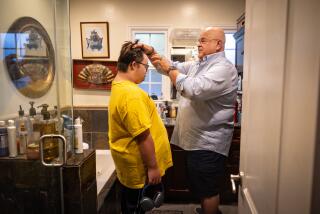Care Center Opens for AIDS Patients
- Share via
San Diego on Thursday became the third city in the U.S. to launch an innovative program of day health-care service for AIDS patients.
A local foundation celebrated the opening of the San Diego AIDS Adult Day Health Care Center downtown, following the lead of prototype centers in New York City and San Francisco.
The day health care concept has been heralded by the centers’ organizers as the most cost-effective way to provide treatment to patients in the middle to late stages of AIDS.
The San Diego center, which expects to receive state licensing next week, will offer drug treatment supervision, checkups, mental health counseling, physical therapy, hot meals and recreational activities for people suffering from AIDS, said Terry Cunningham, the center’s administrator. Screening of clients will follow licensing approval, he said.
Eligibility for the center will be determined by referrals from doctors and county AIDS case workers. A social worker at the center will also screen patients.
Most cities have no intermediary system of care between home and hospital, Cunningham said. The average cost of a one-day hospital stay for an AIDS patient in San Diego is $700; home care administered by a nurse starts at about $150 an hour. Many of the home or hospital patients could get the same services at a day health care center at a cost of $114 for a minimum four-hour visit, Cunningham said.
If similar centers proliferate, organizers say, the burden of housing the growing number of AIDS patients at hospitals will be alleviated. Room will be made for those who require acute care, and the public health care money saved can be more widely distributed, Cunningham said.
As of Nov. 1, the San Diego County Health Services Department reported 2,947 cases of AIDS, the 13th-largest AIDS population among U.S. cities. Based on the number of reported cases, the county estimates that 150,000 people in San Diego are HIV-positive and at risk of contracting AIDS.
The center, with its staff of eight, is equipped to handle 60 patients each day, from a total of 300. The center estimates it will take a year before it is operating at capacity. The cost for the first year will be about $300,000, which will come from grants by the state, the Alliance Healthcare Foundation and the James Irvine Foundation.
Through the day-center approach, patients may help alleviate the psychological effects of being isolated with a life-threatening disease, said Jim Illig, director of Continuum HIV Day Services in San Francisco.
“The benefits are from a sort of ripple effect that starts with those who have dealt with the depression and the downward spiral,” Illig said. “They help others discover ways to stave off the sickness that may be coming down the line. Patients learn how to stay healthy. They are teaching each other.”
But Illig said he has also witnessed drawbacks to the day center system, including patients who do not cope with the deaths of those around them. In 16 months, about one-third of Continuum’s estimated 175 patients have died.
“The deaths take a toll,” Illig said. “One of the things people come here with is denial. If you are still in good condition, seeing someone in a wheelchair or someone who is going blind or someone who just disappears can be devastating.”
To accommodate the changing needs of its patients, the health day care center at the Village Nursing Home in New York City has revamped its programs since opening in August, 1988.
“We have changed our definition,” said Ed Butler, Village Nursing Home director of the AIDS programs.
Originally, center organizers thought the client base would be middle class men who had sex with men. But the majority of patients turned out to be the poor, drug abusers and women with families, Butler said.
“In New York City, AIDS hasn’t left the gay and bisexual circles,” Butler said. “But it is definitely becoming an epidemic of the underclass.”
The center hired a social worker and substance abuse counselor, increased meal service and enlisted a corps of therapists, who use poetry, music, massage and acupuncture to treat drug abuse and mental illness.
San Francisco’s center has had to deal with similar problem areas, Illig said. And San Diego can expect the same.
“I’m predicting San Diego’s going to see the same clients we are,” Illig said. “We thought our programs would attract a wide range of people. But the ones who end up coming here are those who have no other choice. They are the people who have driven off all the people who would care for them. They don’t have their relatives, and their friends may not be in any condition to care for them. We didn’t anticipate we would have this many people with substance abuse problems.”
Illig said 83% of the center’s clients are also being treated for substance abuse.
Illig, who served as a consultant to the San Diego program, said the center’s next major hurdle is getting reimbursed for care from Medi-Cal. He said Medi-Cal eligibility requires that patients be disabled with an HIV-related disease.
“With this disease, disability comes and goes,” he said. “A patient can be in extreme danger and still not appear disabled. Through treatment at the center, we can often head off much more costly emergency room hospitalization. We are still in the process of convincing Medi-Cal of this. . . . It’s not like other diseases. You have to adapt for AIDS.”
The San Diego AIDS Adult Day Health Care Center is at 1911 5th Ave.
More to Read
Sign up for Essential California
The most important California stories and recommendations in your inbox every morning.
You may occasionally receive promotional content from the Los Angeles Times.













